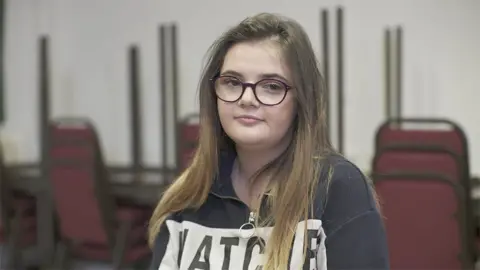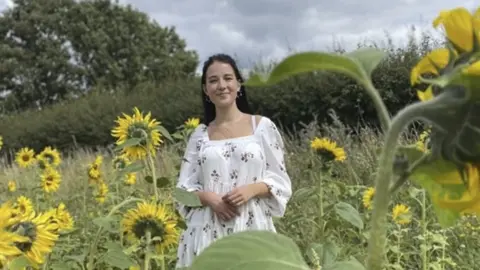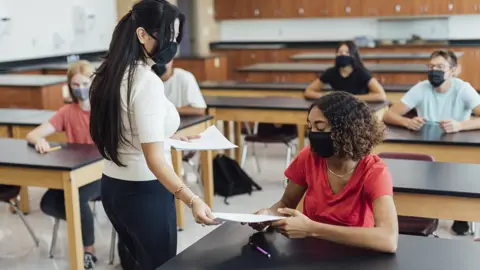Lack of mental health help: ‘I felt nobody cares'
 BBC
BBCThe number of under-18s getting NHS help for mental health issues in England nearly halved in the first two months of lockdown.
Young people who weren't able to get support say they felt like they "didn't really matter".
Lucy, who's 17, says she she didn't know where to go for help.
The number of people in England referred to Child and Adolescent Mental Health Services (CAMHS) dropped 47% in April and May, compared with last year.
CAMHS is the name for NHS mental health support for people until they are 18.
Replies to Freedom of Information (FOI) requests from 40 NHS Trusts in England showed 22,735 patients were referred, compared to 42,887 patients in the same two months last year.
Another 10 Trusts weren't able to answer within the deadline.
The exclusive data was obtained by Radio 1 Newsbeat.
Charities worry a drop like this could happen again if we see a second spike and further lockdowns around the UK.
'There were no face-to-face appointments'
Lucy was someone who wanted a referral but didn't get one.
"I got very behind in my schoolwork which is very unlike me. I had no motivation to get out of bed or do anything at all," she says.
 Contributor photo
Contributor photoLucy, who's from Manchester, had gone to her school for counselling before - but when she wanted help in lockdown, her school was closed.
She didn't feel she could go to her GP either.
"There were no face-to-face appointments which was a bit problematic, because it's really hard to talk about mental health online."
Lucy ended up going for treatment privately after lockdown - she says she's lucky that her mum had private health insurance to help pay for it.
"Everything goes so much quicker when you go privately, but that's a privilege most young people don't have," she says.
"I knew I probably wasn't going to be able to get any help from CAMHS."
The drop in referrals in lockdown "is likely to be because of school closures and the increased difficulties of going to your GP," says Emma Thomas, chief executive at mental health charity YoungMinds.
She adds it might have also been because of "some young people choosing not to look for help at a time when the NHS was under so much pressure."
But she believes many under-18s needed mental health support more than usual at that time, because of fears about the virus, social isolation, the loss of routine and in some cases, losing someone they cared about.
"The combination of worsening mental health and reduced support could create a surge in demand over the coming months," she warns.
'You feel like you should just give up'
After someone is referred to CAMHS, the service decides if they will be given treatment.
As you'd expect from the drop in referrals, the FOI data also showed 40% fewer patients were accepted for help in April and May this year compared to in 2019.
Olivia is 16 and was referred to CAMHS by her GP in March.
She says the worry and stress of her GCSEs, the divorce of her parents, and the social isolation in lockdown made her feel completely alone.
But although she was referred, she was then rejected for treatment twice in lockdown.
She says it made her feel like she "didn't really matter" and "making a big deal out of nothing."
"You feel like you should just give up because nobody really cares."
Olivia thinks pressure on health services in the pandemic played a part in the rejections, as she had been treated with CAMHS previously and was told she could come back to the service in future.
"Accessing the service was difficult pre-Covid, but it's certainly much, much harder since Covid hit," she says.
"It was quite apparent, or my instinct said, the reason it was more difficult was because of Covid.
"It certainly impacted on our situation and made it a much more lengthy process."
It was only after a third referral - and lockdown restrictions lifted - that Olivia got treatment in August.

What is CAMHS?
Child and Adolescent Mental Health Services is the name for the NHS support for young people with emotional, behavioural or mental health difficulties.
There are local CAMHS services around the UK, made up of people like nurses and psychiatrists, who can help with things like depression, eating disorders, self-harm and anxiety.
You can be referred by a parent, carer, teacher or GP.
You then get an initial appointment to decide if you will get treatment and what it will be.

'The NHS must be prepared'
"It is impossible to predict the long-term impact of the coronavirus crisis on the nation's mental health," says Leila Reyburn, Policy and Campaigns Manager at mental health charity Mind.
"But we know that the NHS must be prepared for an increase in people seeking support as we emerge from lockdown.
 Getty Images
Getty Images"Mind recently conducted a survey of almost 2,000 13 to 24-year-olds and nearly half told us that their mental health deteriorated during lockdown, with 42% saying they had tried but been unable to access support during this time.
"It is vital that existing commitments are delivered particularly as we prepare for a potential second spike in coronavirus cases."
A spokesperson for NHS England said the NHS has been open to help people throughout lockdown.
"It is entirely understandable during the early stages of a pandemic, that some young people and their parents may have felt uneasy about seeking help, but it's important to be clear that the NHS has remained open throughout and referrals are actually climbing since May - with mental health services available."

How to get mental health help
You can go to your GP or school for mental health support - they can help or refer you to a service like CAMHS.
Mental health charity YoungMinds suggests helplines, textlines and online chat services.
Childline, Samaritans and the YoungMinds Crisis Messenger all provide 24/7 support.
The charity The Mix is also providing online, phone and counselling support as normal.
You can also visit the BBC Action Line for help with mental health and other issues.


